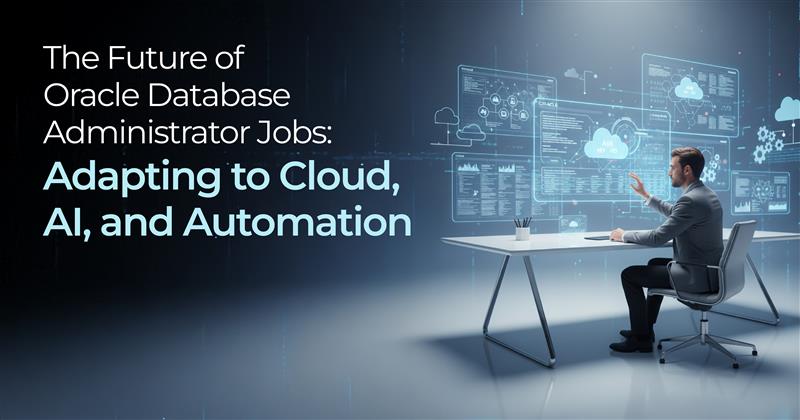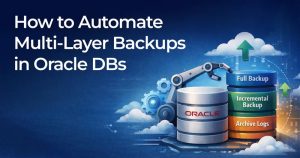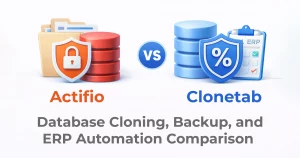Oracle Database Administrators (DBAs) have long been the backbone of an organization’s database management system, ensuring data availability, integrity, and performance. Traditionally, the role has focused on tasks such as database installation, backups, patch management, and performance tuning. However, as technology evolves, so too does the role of the Oracle Database Administrator Jobs.
The future of Oracle Database Administrator jobs is heavily influenced by the rise of cloud computing, automation, and artificial intelligence (AI). As businesses increasingly migrate to cloud platforms like Oracle Cloud Infrastructure (OCI), automate routine database tasks, and leverage AI for performance optimization, the job landscape for DBAs is changing rapidly. In this article, we will explore how Oracle DBAs must adapt to these trends, the skills required to stay competitive, and the future scope of the profession.
1. Cloud Adoption: The Shift to Oracle Cloud Infrastructure (OCI) and Hybrid Environments
Cloud Computing: A Game Changer for DBAs
Cloud computing has transformed the way businesses manage their IT infrastructure. With cloud services, companies can scale resources quickly, reduce capital expenditures, and ensure high availability without the need for significant on-premise hardware investments. Oracle DBAs are no exception to this shift, as more companies are migrating their Oracle databases to cloud platforms, especially Oracle Cloud Infrastructure (OCI).
OCI provides organizations with an integrated suite of cloud applications, platform services, and enterprise-grade database management tools. For Oracle DBAs, this move to the cloud signifies a change in how they perform many of their core responsibilities. Instead of managing physical database servers, Oracle DBAs must now focus on managing databases in a cloud environment, leveraging the flexibility and scalability of OCI to optimize database performance.
The Hybrid Cloud Trend
While cloud adoption is rising, many organizations still rely on on-premise infrastructure for certain workloads, leading to the widespread use of hybrid cloud environments. Hybrid cloud models combine the best of both worlds—on-premise systems for legacy applications and cloud services for more scalable, flexible database management.
For Oracle DBAs, this hybrid model introduces new challenges and responsibilities. They must integrate cloud and on-premise systems, ensure consistent data management, handle migrations, and address issues related to security and compliance. As the demand for hybrid cloud environments grows, Oracle DBAs will increasingly be called upon to bridge the gap between traditional databases and cloud-based solutions.
Skills for Cloud-Based Oracle DBAs
As the cloud continues to shape the DBA role, Oracle DBAs must expand their skill sets. Familiarity with cloud platforms such as Oracle Cloud, AWS, and Microsoft Azure is crucial. Key skills include:
- Oracle Cloud Infrastructure (OCI) Management: Understanding how to deploy, manage, and optimize Oracle databases on OCI.
- Cloud Database Migration: Knowledge of tools and techniques for migrating on-prem databases to the cloud with minimal downtime.
- Cloud Security: Ensuring cloud-based databases are secure, compliant with regulations, and free from vulnerabilities.
Oracle DBAs with expertise in cloud computing will be in high demand, as businesses continue to embrace cloud-first strategies.
2. Automation in Database Management: Reducing Manual Tasks and Enhancing Efficiency
The Rise of Automation
One of the most significant trends impacting Oracle DBAs is the rise of automation in database management. Automation tools have the potential to streamline repetitive tasks, improve efficiency, and reduce human error. Tasks such as database provisioning, backup management, patching, performance tuning, and monitoring can now be automated using advanced software tools.
Oracle itself has invested heavily in automation, with tools like Oracle Enterprise Manager (OEM) and Oracle Autonomous Database providing DBAs with the ability to automate routine tasks. These tools enable automated database health monitoring, automated patching, self-repair, and performance optimization. For Oracle DBAs, this means a shift away from manual intervention towards more strategic decision-making roles.
Benefits of Automation
For Oracle DBAs, automation brings several benefits:
- Increased Efficiency: Routine tasks such as database backups, monitoring, and patching can be automated, allowing DBAs to focus on more strategic aspects of database management.
- Improved Database Performance: Automation can help identify performance bottlenecks in real time, ensuring databases operate optimally without requiring constant human oversight.
- Reduced Risk of Human Error: By automating key processes, Oracle DBAs can reduce the likelihood of manual errors that could lead to downtime or security breaches.
Future Role of DBAs in an Automated Environment
While automation reduces the need for manual intervention, it does not eliminate the role of the DBA. Instead, Oracle DBAs will take on more strategic responsibilities, such as:
- Designing and implementing automation workflows: Setting up and maintaining automation scripts and tools that ensure databases run smoothly.
- Handling exceptions: While most tasks can be automated, DBAs will still need to address complex issues that automation cannot resolve.
- Monitoring AI/ML algorithms: As AI becomes more integrated into database management, DBAs will oversee AI tools to ensure they perform as expected.
In the future, Oracle DBAs will evolve from being technicians to becoming more like data strategists and architects, focusing on designing and optimizing automated workflows.
3. The Role of AI in Database Tuning and Performance Optimization
AI and Machine Learning in Oracle Databases
Artificial intelligence and machine learning are increasingly being integrated into Oracle databases to help automate database tuning and performance optimization. Oracle’s Autonomous Database is one of the leading examples of how AI can be applied to database management. It uses machine learning algorithms to automate tasks such as performance tuning, self-healing, auto-scaling, and auto-patching.
For Oracle DBAs, AI means a significant shift in how database optimization is approached. Traditionally, DBAs had to manually identify and resolve performance bottlenecks. Now, AI-powered systems can monitor databases in real-time, learn from patterns, and automatically adjust configurations to optimize performance without human intervention.
How AI Improves Database Management
- Self-Tuning: AI algorithms can continuously adjust system parameters to ensure that the database operates at peak performance.
- Predictive Analytics: AI can predict potential issues, such as database slowdowns or outages, before they occur, allowing DBAs to address problems proactively.
- Automated Security: AI systems can monitor database activity and detect anomalies that could indicate security threats, such as unauthorized access or unusual queries.
DBA’s Role in an AI-Driven Database World
Even with AI handling many of the routine optimization tasks, Oracle DBAs will still be responsible for overseeing the AI tools, interpreting the data, and intervening when necessary. The DBA’s role will shift towards:
- Customizing AI algorithms: Ensuring AI models are tailored to the specific needs of the organization.
- Interpreting AI results: Understanding how AI suggestions can impact the database and making informed decisions based on the data.
- Maintaining security and compliance: Ensuring AI-driven databases adhere to organizational and regulatory requirements.
4. Future Requirements for Oracle Database Administrator Jobs
Evolving Skillset for Oracle DBAs
As the DBA role evolves, so too must the skills of Oracle professionals. The key areas for Oracle DBAs to focus on in the coming years are:
- Cloud Expertise: Familiarity with Oracle Cloud, OCI, and other cloud platforms such as AWS and Azure will be crucial. Oracle DBAs must understand cloud architecture, database migration, and cloud security.
- Automation and Scripting: As automation becomes the norm, Oracle DBAs will need to be proficient in tools like Ansible, Terraform, and Python to automate database management tasks.
- AI and Machine Learning: A basic understanding of AI and machine learning will be essential for Oracle DBAs to work effectively with AI-powered database solutions.
- Security and Compliance: As more organizations move to the cloud, ensuring that databases are secure and comply with regulatory standards will be a priority for DBAs.
Certifications and Professional Development
Oracle DBAs who want to remain competitive in the future job market should pursue certifications and training in key areas:
- Oracle Cloud Infrastructure (OCI) certifications
- AI and machine learning for databases
- DevOps and database automation tools
New Career Paths for Oracle Database Administrator Jobs
As Oracle databases continue to evolve, new career paths are emerging:
- Cloud Database Architect: Specializing in designing cloud-based Oracle database systems.
- AI/ML Specialist for Databases: Focused on optimizing database management using AI and machine learning tools.
- Database Security Specialist: Ensuring that cloud-based Oracle databases meet security and compliance standards.
Conclusion
The future of Oracle Database Administrator jobs is undoubtedly shaped by cloud computing, automation, and AI. As organizations continue to embrace cloud-first strategies and leverage AI for performance optimization, Oracle DBAs will need to adapt their skill sets, learn new tools, and embrace automation to stay competitive.
While these technological advancements may change how Oracle DBAs perform their day-to-day tasks, the need for skilled professionals to manage and optimize databases will remain. The key to thriving in this new environment is continuous learning, embracing new technologies, and developing the skills needed to manage Oracle databases in a cloud and AI-driven world.
For Oracle DBAs looking to future-proof their careers, now is the time to invest in cloud and AI certifications, learn automation techniques, and embrace the evolving nature of the database management profession. By doing so, they can ensure that they remain indispensable in an increasingly complex and data-driven world.




